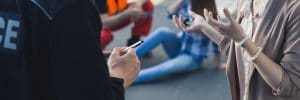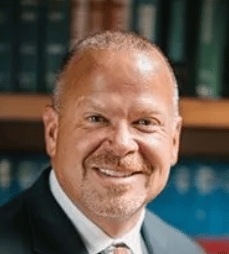 In film and television, when the prosecutor says he has an eyewitness, you always see a look of dismay on the face of the defendant. The truth is, eye witness testimony isn’t always right, and that testimony is often easily debunked. So if a law enforcement officer or the D.A. tries to coerce a confession based on an eyewitness, remember that most eyewitnesses make mistakes – and that law enforcement is allowed to lie to you.
In film and television, when the prosecutor says he has an eyewitness, you always see a look of dismay on the face of the defendant. The truth is, eye witness testimony isn’t always right, and that testimony is often easily debunked. So if a law enforcement officer or the D.A. tries to coerce a confession based on an eyewitness, remember that most eyewitnesses make mistakes – and that law enforcement is allowed to lie to you.
Misidentification is common
According to the New England Innocence Project, “Eyewitness misidentification contributed to approximately 71% of the more than 300 wrongful convictions in the United States overturned by post-conviction DNA evidence.” Yet law enforcement continues to rely on witnesses, despite the multiple variables that can lead to mistakes. Research analyzed and published by the Proceedings of the National Academy of Sciences (PNAS) identifies those variables as estimator or system:
Estimator variables include such things as the viewing conditions (e.g., lighting, distance, duration), the presence of distracting stimuli (e.g., weapons, bright lights, loud noises), and internal states of the observer (e.g., attention, motivation, skill, prejudice). The criminal justice system has no control over these variables but they must be taken into account. System variables, by contrast, are those that can be controlled by the criminal justice system and include such things as the manner in which a lineup is presented to an eyewitness, the instructions given, and whether the lineup administrator is blind to the status of the lineup participants.
System variable can affect all manner of identification, so it is important that, when they are used, the identification process is conducted fairly. Failure to do so can lead to a person’s charges be dropped.
Common types of system identification
- Human lineups. Fairness and due process requires that lineups be organized so that the eyewitness isn’t biased or predisposed to pick certain people over others. A lineup with six people shouldn’t have five short people and one tall person when the victim states the assailant was tall. The participants in the lineup should generally be more similar in appearance than dissimilar so that the eyewitness has to make a valid choice.
- Photo-lineups. Sometimes, the eyewitness will be asked to look through a stack of photos. As with the human lineup, the people in the photo review should look similar so the lineup isn’t biased.
- Audio identifications. An eyewitness may not have seen the attacker but may have heard his/her voice. The rules of fairness and due process apply to audio identification too.
How skilled defense lawyers question an eyewitness account
As criminal defense lawyers, we will try to raise doubt about an eyewitness account. Some of the strategies we may employ to do that may include:
- Showing that the eyewitness was too focused on something else. If violence occurred or a weapon was involved, the witness most likely was too concerned about his/her safety to focus on getting a good look at the assailant.
- Questioning the ability to see the victim. This includes raising doubt because it was dark or cloudy or because the criminal was wearing a mask.
- Showing that the witness had a bias. For example, did the police imply or suggest the defendant was the person responsible? Was the lineup inherently unfair? Does the witness have other biases against the accused that could have been revealed in previous interactions or social media posts?
- Addressing physical problems or conditions. We question the vision of the eyewitness, whether the witness was intoxicated, or other physical problems that could create reliability concerns.
- Questioning overall credibility. We also may question the credibility of the eyewitness by comparing some statements with other statements or with other known facts. Inconsistent statements suggest the eyewitness is not credible.
At Delius & McKenzie, PLLC, we know that eyewitnesses are often wrong. If the case hinges on that witnesses account, we do everything possible to ensure it is discredited. Our Sevierville criminal defense lawyers aggressively fight to try to obtain a dismissal of the charges or an outright acquittal. To meet with a knowledgeable and respected criminal defense lawyer, call (865) 428-8780 or complete our contact form to make an appointment. We handle cases in Sevierville, Seymour, Gatlinburg, Pigeon Forge, and the surrounding Tennessee areas.

Attorney Bryan E. Delius was born and raised in Sevier County, TN. He founded Delius & McKenzie more than 20 years ago, after receiving his JD from the University of Tennessee at Knoxville. He is admitted in Tennessee and in several federal court systems. Learn more about Bryan E. Delius.




